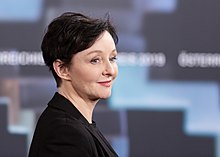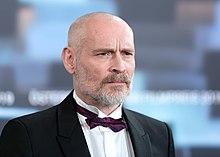The tobacconist (film)
| Movie | |
|---|---|
| Original title | The tobacconist |
| Country of production | Austria , Germany |
| original language | German |
| Publishing year | 2018 |
| length | 113 minutes |
| Age rating | FSK 12 |
| Rod | |
| Director | Nikolaus Leytner |
| script |
Klaus Richter , Nikolaus Leytner |
| production |
Dieter Pochlatko , Jakob Pochlatko , Ralf Zimmermann |
| music | Matthias Weber |
| camera | Hermann Dunzendorfer |
| cut | Bettina Mazakarini |
| occupation | |
| |
Der Trafikant is an Austrian-German feature film by Nikolaus Leytner from 2018 based on the novel of the same name by Robert Seethaler (2012) with Simon Morzé as Franz Huchel, Bruno Ganz as Sigmund Freud and Johannes Krisch as Otto Trsnjek.
The premiere took place on August 21, 2018 at the Kitzbühel Film Festival , where the production was shown as the opening film. The film was presented on September 30, 2018 at the Hamburg Film Festival . The Austrian theatrical release took place on October 12, 2018, in Germany the film was released on November 1, 2018. The first broadcast on the first was on August 11, 2020.
action
1937: Shortly before Austria's annexation in 1938, the 17-year-old Franz Huchel leaves his home village on the Attersee in the Salzkammergut to do an apprenticeship with the tobacconist Otto Trsnjek, a war invalid from the First World War , in Vienna . The founder of psychoanalysis, Sigmund Freud, is one of his regular customers . Franz is in love with the young Bohemian variety dancer Anezka and seeks advice from Freud. The female gender is also a mystery to that. An unusual friendship developed between the young Franz and the 82-year-old Freud, who left Austria on June 4, 1938 and emigrated to London. Franz becomes a contemporary witness of National Socialism in Vienna .
Otto Trsnjek is denounced by the neighboring butcher to the Gestapo , his shop is devastated and he himself is picked up by the secret police. Franz calls in at the Gestapo headquarters, but receives no information and is thrown in front of the door. Later he receives a message that the tobacco shop operator died on May 14 of a heart condition and a package with Trsnjek's personal belongings is sent to him.
Since “his” Anezka is in a relationship with an SS officer, Freud emigrated and Trsnjek was killed in the Gestapo cellars, Franz used the (one-legged) tobacconist's trousers as a flag in front of the Gestapo headquarters at night. The next day, Franz is picked up by the Gestapo.
Some time later, Anezka is standing in front of the abandoned and closed tobacco shop. Franz had pasted his dream descriptions on the outside of the window. Anezka takes the one in which a Bohemian girl jumps out of the swing.
Production and Background
The shooting took place from October 2 to November 22, 2017, and the shooting took place in Vienna , Bavaria , South Tyrol and Upper Austria . The filming locations included the local train station of the Steyrtalbahn in Steyr , Sterzing and the Bavaria Filmstadt . Scenes that take place in Berggasse in Vienna's ninth district of Alsergrund were filmed in the third district behind the Heumarkt.
The film was produced by the Austrian Epo-Film , co-producers were the Munich Glory Film and the Berlin Tobis Film , the Austrian Broadcasting Corporation and the ARD ( Degeto ) were involved. The production was supported by the Austrian Film Institute and the Vienna Film Fund , Filmstandort Austria, the State of Upper Austria , Cine Art ( State of Styria ), the Film Funding Agency , the FilmFernsehFonds Bayern , the German Film Funding Fund , the Filmbüro Rheinland-Pfalz, IDM and Tax Credit Italy.
Caterina Czepek was responsible for the costume design, Bertram Reiter for the production design, Max Vornehm for the sound and Sam Dopona, Verena Eichtinger and Sylvia Niehues for the make-up. The author of the novel, Robert Seethaler , has a cameo in the film .
reception
Bettina Steiner found in the daily newspaper Die Presse that the film had too much of a historical ham and did not hit Seethaler's light tone. However, at least keep history captive. There are a few nice scenes, but even then it is annoying that everything is a little too picturesque. "You always get the feeling that the actors are moving through the scenery, through a picture-book city bathed in sepia, full of good old picture-book bicycles and good old picture-book cars and picture-book butchers with picture-book-like bloody aprons."
Marian Wilhelm gave a similar verdict in the Tiroler Tageszeitung : “The film is clearly struggling to keep its time. The outlay for the equipment is great. Nevertheless, a lot of props remain, just as if the characters were roaming through a lovingly designed museum complex. ”However, he praised the acting performances, which would convince.
Stefan Grissemann wrote in the weekly Profil that the novel deserves a better film adaptation. The film is a didactic piece of literature failure and owes almost everything to Seethaler's novel. The result is “a film of decoration and scenery in which nothing appears believable: the tobacco shop is a theater, the butcher shop next door is just a facade. Vienna 1938 as a synthetic, high-pressure cleaned stage set. "
Matthias Greuling opposed this in the Wiener Zeitung , saying that Nikolaus Leytner tried with great attention to detail to reconstruct the mood in Vienna before the “Anschluss” and immediately afterwards. He succeeded in doing this through numerous equipment details and, above all, through his coherent ensemble of actors, who could well illustrate the oppressive mood that determined this time. “Leytner gets a little bogged down in the description of his protagonist Franz's search for love [...]. These scenes are a bit like foreign bodies in this otherwise coherent moral image of the Anschluss. "
Andreas Fischer said in the Weser Kurier that the tobacco shop was thematically as relevant as a film can be nowadays. As a literary film adaptation, however, it is not a masterpiece. Vienna is a dead city in sepia tones. More cliché is almost impossible. The amusing tone of the novel, with its simplicity, is lost in images that appear artificial. The locations are filmed dutifully, life in the film is an artificial one. Director Nikolaus Leytner misjudges the potential of his actors and uses them primarily as a dialogue announcer. The actors, especially the main actor Simon Morzé, could do much more than just be accessories in a staid costume film and historical ham.
Awards and nominations
German Film and Media Rating (FBW)
- "Predicate valuable"
- Nomination for the best female supporting role ( Regina Fritsch )
- Nomination for the best male supporting role ( Johannes Krisch )
- Nomination for the best costume design ( Caterina Czepek )
- Nomination for the best music ( Matthias Weber )
- Nomination in the category of best cinematographic design ( Hermann Dunzendorfer )
Film Festival Bozen 2019
- Golden Walther Award
New Faces Award 2019
- Nomination in the Best Young Actor category ( Simon Morzé )
CIVIS Cinema Prize 2019
- Awarded the audience award for European film productions
Web links
- The tobacconist in the Internet Movie Database (English)
- The tobacconist at crew united
- The tobacconist at filmportal.de
- The tobacconist at tobis.de (co-producer)
Individual evidence
- ↑ Release certificate for Der Trafikant . Voluntary self-regulation of the film industry (PDF; test number: 180533 / K).
- ↑ Kitzbühel Film Festival from August 20 to 26 . Retrieved July 19, 2018, July 19, 2018.
- ^ Tiroler Tageszeitung: "Trafikant" at the start of the festival in Kitzbühel . Article dated July 27, 2018, accessed March 5, 2020.
- ↑ Hamburg Film Festival 2018 | The tobacconist . Retrieved September 11, 2018.
- ↑ a b c d Austrian Film Institute: The tobacconist . Retrieved July 19, 2018.
- ↑ Der Trafikant (2018): Release Info . Retrieved July 19, 2018.
- ↑ Summer cinema in the first 2020. In: daserste.de. Retrieved June 22, 2020 .
- ^ Epo film: The tobacco shop operator . Retrieved July 19, 2018.
- ^ Kurier: Film and TV star: Sigmund Freud is back in season . Article dated July 10, 2018, accessed July 19, 2018.
- ↑ a b The Depp doctor and the tobacconist he trusts . Article dated October 11, 2018, accessed October 13, 2018.
- ^ Upper Austrian news: Steyrtalbahn location: Simon Morzé and Bruno Ganz in the film adaptation of "Trafikanten" . Article dated September 20, 2017, accessed July 19, 2018.
- ↑ Upper Austrian news: How a boy from the country befriends the doctor of the soul and hell . Article dated October 12, 2017, accessed July 19, 2018.
- ↑ Time for a big, own cinema ( Memento from July 19, 2018 in the Internet Archive ). Article dated July 16, 2018, accessed July 19, 2018.
- ↑ a b Salzburger Nachrichten: "Der Trafikant" is filmed with Bruno Ganz . Article dated October 20, 2017, accessed July 19, 2018.
- ↑ a b The tobacconist at crew united . Retrieved July 19, 2018.
- ↑ a b The tobacconist. In: filmportal.de . German Film Institute , accessed on July 19, 2018 .
- ^ Diepresse.com: "The tobacco shop": Freud with a lot of props . Article dated October 10, 2018, accessed October 11, 2018.
- ↑ Cinema: “The Tobacconist” deserves a better film adaptation . Article dated October 12, 2018, accessed October 13, 2018.
- ↑ How a young man experiences the "Anschluss" . Article dated October 10, 2018, accessed October 11, 2018.
- ↑ Andreas Fischer: More suffering than joy. In: Weser Courier . August 3, 2020, accessed on August 3, 2020 .
- ↑ German film evaluation and media evaluation FBW: Der Trafikant . Retrieved January 20, 2019.
- ↑ Austrian Film Prize 2019: Nominations . Retrieved December 6, 2018.
- ^ Kurier: The nominations of the ROMY Academy 2019 . Article dated March 26, 2019, accessed March 26, 2019.
- ^ The winners of the 33rd Bolzano Film Festival 2019 . Article dated April 13, 2019, accessed April 14, 2019.
- ↑ New Faces Award Film 2019: These are the nominees . Article dated April 23, 2019, accessed April 23, 2019.
- ↑ Public voting for CIVIS cinema price: Vote online for the cinema price for integration films . Article dated April 27, 2019, accessed April 28, 2019.
- ↑ CIVIS CINEMA | Cinema award for European film productions as audience award on the Internet . OTS notification dated April 24, 2019, accessed April 28, 2019.
- ↑ CIVIS Media Prize 2019 - 14 programs awarded in Berlin . Article dated May 23, 2019, accessed May 24, 2019.


